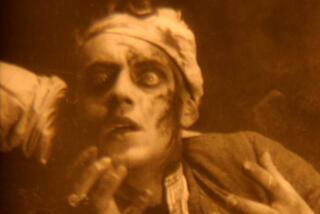BOOK REVIEW : A Flash Point in History Revisited
- Share via
THUNDER AT TWILIGHT: VIENNA, 1913-1914 by Frederic Morton Scribner’s $22.50, 385 pages
Some times and places are dense with history in the making; surely the people of the Soviet Union, Germany and Eastern Europe are living through precisely such an era right now.
In “Thunder at Twilight,” novelist and historian Frederic Morton shows us another such time and place: Vienna on the eve of World War I. As Morton reminds us, it was the crucible where the passions that continue to shape our world first reached a flash point.
Morton, for example, captures the astounding moment during the carnival season of 1913 in Vienna when Freud, Stalin, Hitler and Trotsky all were at work in the same city at the same time, each stoking the fires of history in the thrall of his own subversive vision.
Morton gives an account that is rich with historical irony. We see Hitler as a 23-year-old failed artist who unwittingly entertains his fellow “losers” at a shelter for homeless men with “the gesticulations of a clown and the screeching of a demon.” We see Stalin on a secret mission to Vienna, where he studies the same problem of ethnic and national rivalry that now plagues the Soviet Union--Vienna, Morton points out, was a “facade of neoclassic serenity” concealing “a witches’ Sabbath of nationalisms.”
At the pinnacle of the glittering but corrupt edifice of imperial Vienna were the Hapsburgs, including the aging emperor and the crown prince, whose assassination at Sarajevo would set World War I in motion and put a bloody end to the old order.
Spies and counterspies of the great powers stalked each other through the streets of Vienna; Freud conducted his own doctrinal guerrilla warfare against adversaries in the international psychoanalytical movement; Hitler seethed with half-mad visions.
Running through the book like the sputtering fuse of an anarchist’s bomb is the story of how the assassins of Archduke Franz Ferdinand stalked their prey--and, at the same time, how imperial Europe moved inexorably toward war.
Morton is a grand stylist and an elegant raconteur; his prose reminds me of a Viennese pastry: rich, creamy, ornate, but sometimes indigestible.
Emperor Franz Joseph is “the weathered centerpiece of a patinaed court.” Stalin is “a grim virtuoso wearing the mask of a clod.” Freud and Trotsky are kindred spirits, “full-blooded subverters of burgher pieties.”
Still, like a pastry, I found “Thunder at Twilight” to be irresistible.
For example, Morton tells the story of a high-ranking Austrian officer who turned out to be a Russian spy. He was offered “a suicide pistol” as the only honorable solution. When the old emperor heard of the scandal, he was too troubled to sleep. “So this is the new era?” said the old man to his adjutant. “And that kind of creature comes out of it?”
And we may ask the very same questions of the uncertain dawn that is breaking in Europe today.
More to Read
Sign up for our Book Club newsletter
Get the latest news, events and more from the Los Angeles Times Book Club, and help us get L.A. reading and talking.
You may occasionally receive promotional content from the Los Angeles Times.










